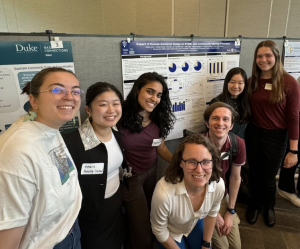During my undergraduate education, I worked towards pursuing interdisciplinary courses to tackle real-world problems with a multi-faceted approach.
POLISCI 238: Racial Attitudes, Racial Prejudice, and Racial Politics
Term: Fall 2022, 140 Hours
Instructors: Dr. Candis Watts Smith
Summary: This course aims to explore the evolution of racial attitudes and politics, and their impacts on various racial and ethnic minority communities within the United States. Additionally, it discusses how these attitudes influence the development of social, legal, and political outcomes, permeating into various sectors such as healthcare, education, and immigration. Within this course, I learned about racial disparities within the development of medical technology and healthcare systems, and the biased applications of artificial intelligence in health, the criminal justice system, and housing. This course reaffirmed the importance of engineering medicines and technologies that are ethical and address social determinants of health.
POLISCI 425: Global Inequality Research

Term: Fall 2023, 140 Hours
Instructors: Dr. Elizabeth Degefe, Dr. Quran Karriem, Dr. William Darity
Summary: This course is intended for students to pursue vertically integrated research projects that focus on racial disparities and inequality issues related to one of The Cook Center for Social Equity’s six research domains. During this semester the theme was particularly focused on Digital Bias and Machine Learning for DEI Research where we learned how to utilize machine-learning techniques for applications in inequality studies. I learned a lot about the role of digital automation and mathematical models in biased social systems and the exacerbation of social inequalities through weekly discussions. Our team’s research project, “Using machine learning to analyze urban-rural residency impacts on health outcomes in New York State” analyzed a dataset of hospitalization stays (N = 2158357) through statistical testing and random forest modeling to examine the top predictors of health severity. Overall, we explored if hospital locationality impacted a patient’s severity of illness, risk of mortality, and length of stay, producing a final manuscript and poster.
Bass Connections — Ignite: Improving Students’ STEM-Identity Through Human-Centered Design, Student Researcher

Term: Fall 2023 — Present
Instructors: Dr. Megan Madonna, Dr. Nimmi Ramanujam
Summary: Ignite is an engineering curriculum developed by the Center for Global Women’s Health Technologies at Duke University aligned with the mission of encouraging creative innovators and problem-solvers to utilize human-centered engineering design to address some of the world’s most pressing challenges. Building off of an evidence-based peer-led co-learning model to teach human-centered engineering education, Ignite works to increase interest in STEM and STEM retention for young students in NC.
In Bass Connections, I work within a research team for Ignite’s 2024 implementation of the middle-school program with a focus on increasing student self-efficacy scores, tinkering efficacy, and attitudes towards community-driven problem-solving. Throughout the project, we worked on the development of a foundational research study, including the generation of literature-validated survey metrics, methodology, and framework. We obtained Institutional Review Board approval, and have successfully implemented the study. This experience has shown me how important it is to train future problem-solvers to address future health issues and engineer better medicines.